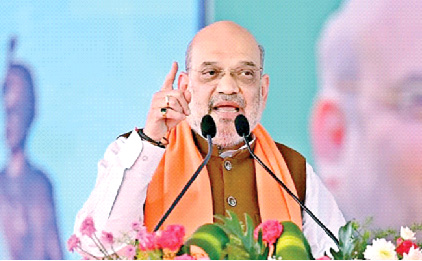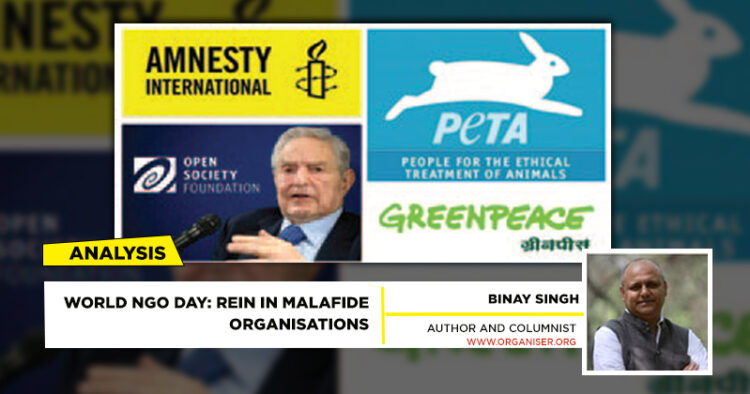Money laundering by NGOs can be equated to agenda laundering. When anti-India organisations engage in money laundering, it often leads to the laundering of ideas and agendas. The phrase “No Funds, No Terror” encapsulates the idea that funding serves as the lifeblood of terrorism worldwide. Recently, we witnessed the emergence of versions like the 0.5 Version of terrorist outfits such as the Popular Front of India (PFI), which exploited soft provisions of the Indian Constitution to undermine Indian democracy. Laws intended to safeguard Indian citizens were manipulated to shield the terrorist intentions of such outfits. The implementation of the Foreign Contribution (Regulation) Act (FCRA) in 2020 unveiled a new modus operandi for terror funding, including tactics like ‘Pocket Funding’.
Rooting out Terrorism
On November 19, 2022, Union Home Minister Shri Amit Shah proposed the establishment of a permanent Secretariat for “No Money for Terror (NMFT)” to combat terrorism financing globally. He emphasised the need for a unified definition of terrorism and terror financing across all countries and called for preventing the misuse of Non-Profit Organisations (NPOs) to propagate terrorist ideologies.
The FCRA, enacted in 1976 and enforced by the Ministry of Home Affairs (MHA), regulates the inflow of foreign contributions or aid into India. The Act was introduced to prevent foreign organisations from influencing various aspects of Indian society, including social, political, economic and religious discussions. Initially, the 1976 Act allowed non-profit organisations to freely receive foreign donations, albeit with the requirement to annually report the received and spent amounts.
In 1984, amendments made it mandatory for non-profit organisations to register before accepting foreign donations and prohibited the transfer of such funds to unregistered entities. Subsequent amendments solidified the FCRA’s focus on regulating non-profit organisations with foreign contributions. The FCRA underwent significant revisions in 2010, resulting in the repeal of the 1976 Act and the introduction of the Foreign Contribution (Regulation) Act, 2010, along with the Foreign Contribution (Regulation) Rules, 2011.
The Parliament approved an amendment in 2018 that revised the definition of the term “foreign source”.
The Foreign Contribution (Regulation) Amendment Bill, 2020, introduced in Lok Sabha on September 20, 2020, and subsequently passed by both houses of Parliament, came into effect on September 29, 2020. This amendment bill comprehensively redefines terms related to the acceptance, transfer, and utilisation of foreign contributions under the Foreign Contribution (Regulation) Act, 2010.
Stalling Development
Previously, numerous intelligence reports revealed that foreign-aided NGOs were hindering the country’s development. Key issues with rogue NGOs include lack of accountability, obstruction of development projects, and threats to internal security. Firstly, the unaccounted flow of funds to NGOs is a major concern, with only 10 per cent of NGO files being returned according to the CBI. Some State laws lack transparency requirements for NGOs, which the FCRA seeks to address through registration. Secondly, NGOs are exploited by vested interests to impede developmental projects in India, as evidenced by the Kudankulam protest. Thirdly, funds directed to NGOs can fuel anti-national activities such as economic subversion, underscoring the necessity for regulating NGO fund recipients.

“On November 19, 2022, Union Home Minister Shri Amit Shah proposed setting of a permanent Secretariat for “No Money for Terror (NMFT)” to combat terrorism financing on a global scale”
There have been instances where NGOs violated the FCRA but evaded penalties under the pretext of the FEMA Act, overseen by the Finance Ministry. The FCRA aimed to monitor funds, which under FEMA, are classified as capital, highlighting the Government’s resolve to prevent misuse of foreign funds. Stringent regulations dictate that all NGO funds must be used solely for their intended purpose and not for speculative activities. Funds cannot be transferred to entities not registered under the Act without prior approval. NGOs are closely scrutinised for compliance, given concerns over anti-national activities and illegal operations.
Destabilising Bharat
Foreign contributions are prohibited in activities like activism and advocacy, prompting creative circumvention methods such as subcontracting consultancy or research assignments. This facilitates the rerouting of foreign funds through local individuals to classify donations as domestic, evading FCRA restrictions. Concerns arise over Islamist and State-backed actors funding NGOs to destabilise Bharat, underscoring the need for vigilance against external interference. Therefore, it is imperative to ascertain the genuine sources of funds, scrutinise individuals managing those funds, and evaluate their backgrounds and intentions. This vigilance is crucial to prevent illicit funds with malicious intent from infiltrating India.
Under the new amended FCRA, foreign contributions cannot be utilised for advocacy and activism. Indian corporations may receive donations via third-party settlements, serving as conduits for foreign interest groups seeking to fund Indian NGOs. Such arrangements may involve agreements between the foreign donor and Indian corporate, wherein the latter receives funds through business transactions and subsequently donates them to an Indian NGO from its domestic account. This circumvents Foreign Inward Remittance route and reporting requirements, facilitating foreign funding for Indian NGOs.
Numerous instances have exposed NGOs like Sabrang misusing and diverting foreign contributions, such as Teesta Setalwad’s misuse of funds for personal expenses. Church-backed NGOs redirected foreign contributions to fuel protests against the Kudankulam nuclear power plant, resulting in restrictions on fundraising from abroad during the UPA regime. Similarly, PFI utilised funds to finance legal representation and anti-CAA protests, indicating the misuse of foreign contributions for controversial agendas.
Many globally headquartered NGOs operate in India through local entities, like Amnesty International and PETA, functioning via Section 25 Companies or Confucius Institutes within universities. While the organisational structure remains ambiguous, these foreign NGOs pursue distinct agendas in India, as evidenced by Amnesty International’s pro-Islamist and anti-India stance and PETA’s anti-Hindu bias.
Foreign NGOs transfer funds to their Indian counterparts through various channels, often without disclosing the quantum of transfers. Notably, the Enforcement Directorate last year attached assets worth Rs 17 crores belonging to Amnesty International India Pvt. Ltd., underscoring the need for transparency and accountability in foreign funding mechanisms.
The misuse of foreign funds is not just a concern of the Indian Government but nearly all the countries have formulated different strategies to deal with the menace of foreign funding
UNITED STATES
In the US, the Foreign Agents Registration Act (FARA) mandates individuals acting as agents of foreign principals to disclose their relationship with the foreign principal and report their activities, receipts, and disbursements. Certain NGOs, particularly charitable 501(c)(3) organisations, may face operational restrictions, including limitations on lobbying, political activities, and commercial activities.
CAMBODIA
The Law on Associations and Non-Governmental Organisations (LANGO) requires NGOs operating in Cambodia to register with the Government, report their activities and finances, or face fines, criminal prosecution, and shutdowns. NGOs receiving foreign funding must obtain a valid Memorandum of Understanding (MoU) with the Government, with violations subject to penalties.
RUSSIA
The ‘Foreign agent’ law mandates NGOs receiving foreign funding and engaging in political activity to register as ‘foreign agents’ and disclose foreign donations annually. Failure to comply can result in prosecution or listing on the ‘foreign agents’ register.
HUNGARY
Hungary’s draft law targets foreign-funded organisations supporting “illegal migration,” requiring their registration and granting authorities the power to tax foreign income and restrict associated individuals’ movement. NGOs working with refugees and migrants have been accused of violating the law, which stems from the Government’s “national consultation on the Soros plan.”
EGYPT
Egypt’s new NGO law requires NGOs receiving foreign funding to notify the Ministry of Social Solidarity (MoSS) and obtain approval within specified timelines. Foreign NGOs must submit periodic financial and activity reports to MoSS, with potential dissolution for non-compliance.
CHINA
China’s evolving legal framework for Overseas Non-government Organisations includes regulations on activities, monitoring, and registration, emphasising social stability and procedural legitimacy. Recent laws impose stricter controls on ONGOs’ temporary activities and student exchange programmes.















Comments